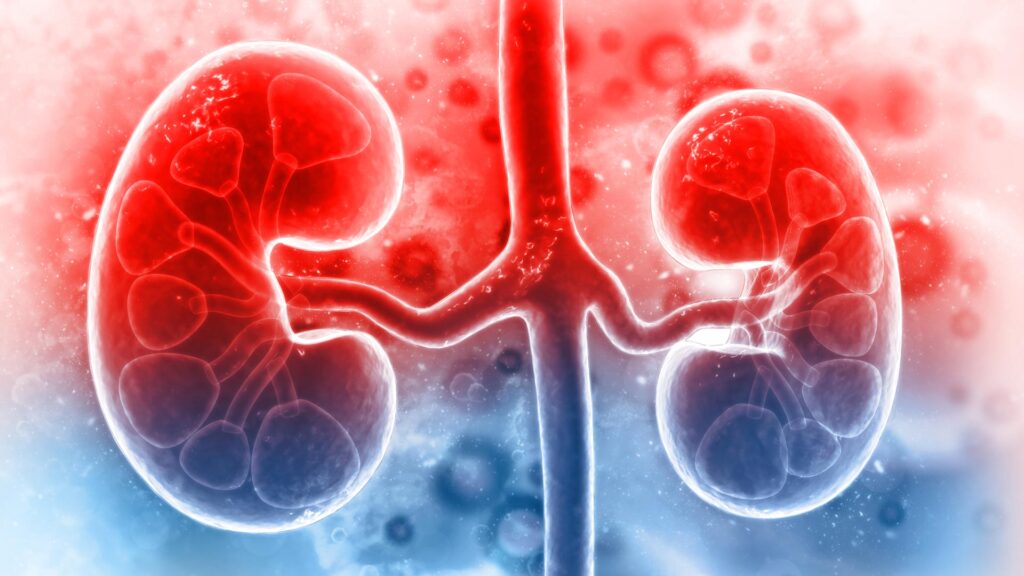
End-Stage Renal Disease Definition
End-Stage Renal Disease is the last stage of chronic kidney disease, where kidney function has declined to the point that the kidneys can no longer function on their own. In end-stage renal disease, the kidneys function below 15 percent of their normal ability. Chronic kidney disease typically doesn’t reach the end stage until 10 to 20 years after a patient is diagnosed.
End-Stage Renal Disease Symptoms
Kidneys with ESRD have a very poor function and because of this, waste and fluid buildup in the body to unhealthy levels. Accumulated waste in the bloodstream can make people feel sick. This is a condition called uremia. When fluid is not removed from the body, tissues will swell and lead to a condition called edema. Excess fluid in the bloodstream can also increase blood pressure. Kidneys with ESRD can’t regulate the levels of electrolytes. Excessive potassium can cause an abnormal heart rhythm.
Causes of End-Stage Renal Disease
Diabetes is the most common cause of ESRD. The other causes of end-stage renal disease are:
-
High blood pressure
-
Autoimmune diseases
-
Genetic diseases
-
Nephrotic syndrome
-
Urinary tract problems
End-Stage Renal Disease Diagnosis
The doctor may use a physical examination and test to check kidney function. These test may include:
-
Estimated glomerular filtration rate (GFR)
-
Urinalysis
-
Serum creatinine test
-
Blood urea nitrogen test
End-Stage Renal Disease Treatment
There are only two treatments for ESRD:
-
dialysis
-
kidney transplant
Hemodialysis is the most common treatment.
Two types of dialysis include
-
Hemodialysis: in this therapy, blood will be sent through a tube to a machine that cleans it by removing the wastes and extra fluid that the kidneys would normally remove.
-
Peritoneal dialysis: in this therapy, some fluid is put into the abdomen. This fluid will absorb the chemicals, other waste, and extra fluid that the kidneys usually remove.
In the kidney transplant, the failed kidneys are replaced with new ones.
Diet Therapy in End-Stage Renal Disease
The extra waste and fluid in the blood can cause heart, bone and other health problems. Patients with ESRD must monitor the amounts of fluid and certain nutrients they take in each day. This can help keep waste and fluid from building up in the blood and causing problems.
Sodium and Potassium Balance
ESRD patients should avoid foods high in sodium. Hypertension in dialysis patients is largely attributed to positive sodium balance and volume expansion. While many patients on dialysis can effectively control blood pressure without drugs on a low-sodium (2 g) diet and a low-sodium (130 mmol) dialysate.
Potassium builds up in the body when kidney function declines. Patients should Avoid the highest potassium foods and track the potassium level by getting regular blood tests.
High potassium foods
-
Banana
-
Dried fruit
-
Legumes
-
Nut and seeds
-
Potatoes
-
oranges
-
Tomato products
Fluid Restriction
It is essential that ESRD patients restrict their fluid intake.
The typical fluid allowance for patients on dialysis is
700-1000 ml/ d plus urine output.
Phosphorus
Management of hyperphosphatemia and renal osteodystrophy has improved with phosphate binders.
Certain factors continue to confound adequate control of phosphorus levels. These include covert phosphate intake from processed foods, treatment with high doses of vitamin D analogues, and the high protein needs of ESRD patients.
If patients are following a low-protein diet, they naturally decrease phosphorus intake, because protein and phosphorus go hand in hand.
patients on hemodialysis should include an abundance of foods of plant origin and avoid processed food.
High phosphorus foods
-
Cheese
-
Chocolate
-
Nuts and seeds
-
Milk and yogurt
Dialysis patients should follow a diet with low saturated fat and cholesterol.
Micronutrient supplements
Micronutrient supplements are essential for ESRD patients. Individuals on dialysis commonly suffer from deficiencies of vitamin C, folate, vitamin B6, calcium, vitamin D, iron, zinc, and possibly selenium.
As a result of restricted intake of many foods and losses of water-soluble vitamins during dialysis, patients are usually given specially formulated vitamins.
End-Stage Renal Disease Complications:
Some complications of end-stage renal disease may include
-
Changes in blood glucose level
-
Nerve damage
-
Increased risk of infections
-
Joint, bone, and muscle pain
-
Abnormal electrolyte levels




